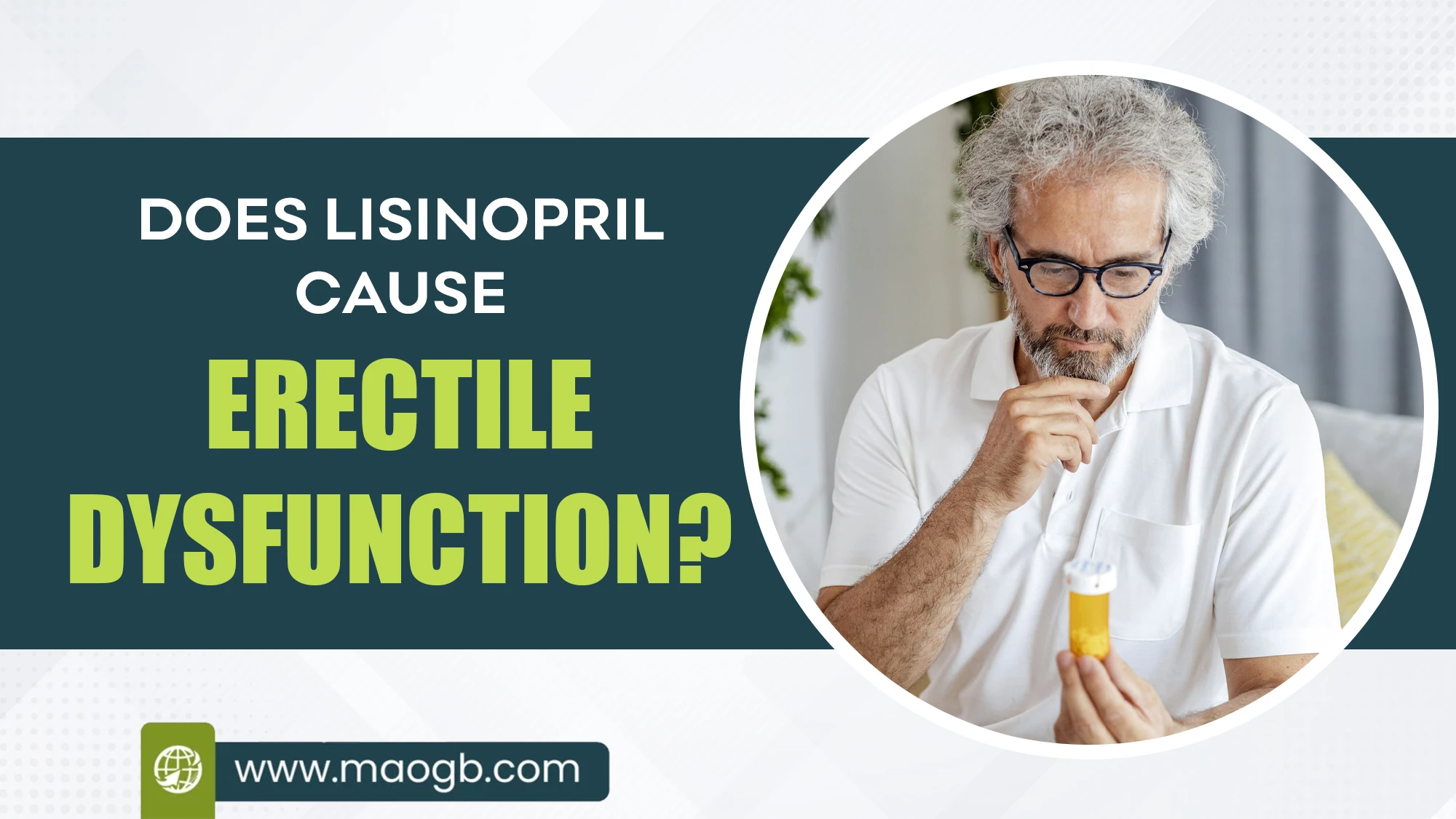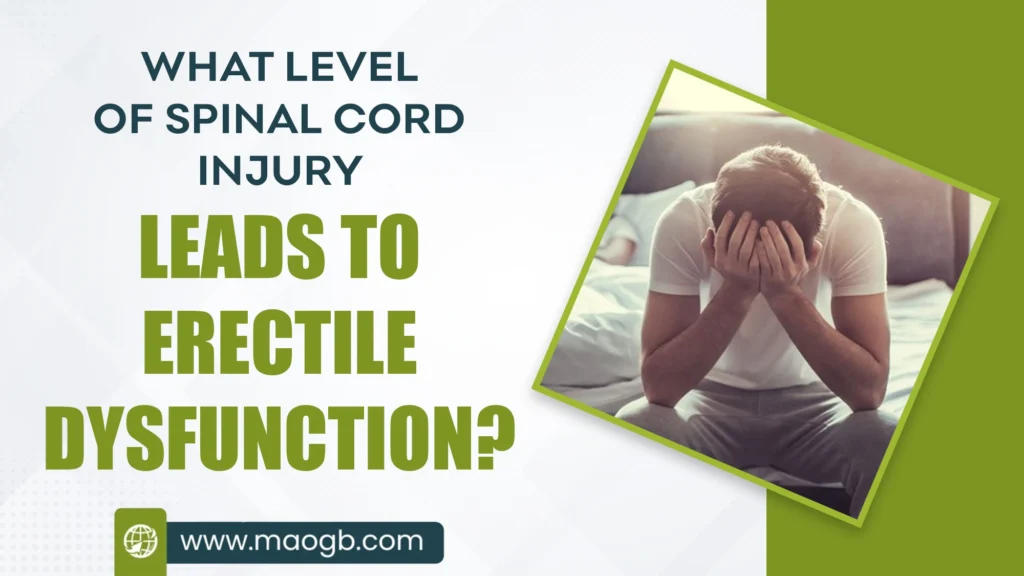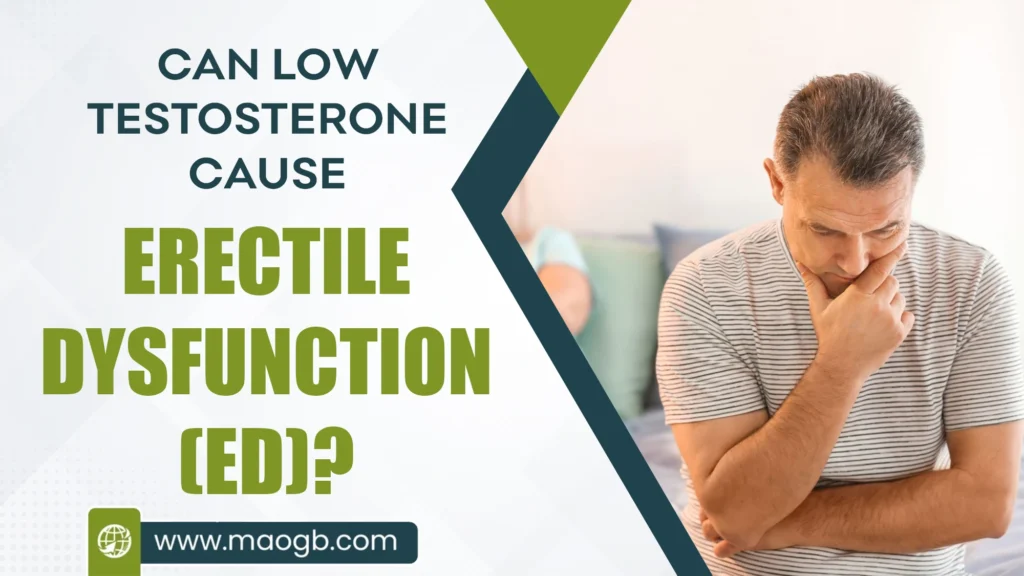Blog
Does Lisinopril Cause Erectile Dysfunction?

Erectile dysfunction (ED) often concerns males using antihypertensive drugs such as Lisinopril, an ACE inhibitor indicated for hypertension and heart failure.
A prevalent inquiry among patients is: Does Lisinopril cause erectile dysfunction? Although not the most prevalent adverse effect, some men have erectile dysfunction when using this drug.
This article examines the possible association between Lisinopril and erectile dysfunction, analyzing clinical research, molecular processes, and therapy options.
We will provide explicit responses to elucidate if your medicine may be impacting your sexual health and outline the measures you may take to handle this delicate matter successfully.
Understanding Lisinopril and Its Effects
Lisinopril efficiently reduces blood pressure by dilating blood vessels; nevertheless, some men have erectile dysfunction (ED) as a side effect.
Although less probable to induce erectile dysfunction than beta-blockers or diuretics, individual responses differ.
For men experiencing ED, taking Lisinopril and Cialis (tadalafil) may help. Cialis, a PDE5 inhibitor, enhances blood circulation for erections and is often safe to mix with Lisinopril under physician supervision.
Always seek your physician’s advice before to concomitant use of these drugs to prevent possible blood pressure issues.
Does Lisinopril Cause Erectile Dysfunction?
Research on whether Lisinopril and Cialis has produced mixed results. Certain studies indicate that ACE inhibitors such as Lisinopril may enhance erectile function by improving blood circulation.
Conversely, some individuals describe instances of patients developing erectile dysfunction after starting the medicine.
Possible Reasons Why Lisinopril May Cause ED
- Blood Pressure Reduction – Although decreasing blood pressure is advantageous, severe reductions may impair blood flow to the penis, complicating the attainment of an erection.
- Hormonal Effects – Certain drugs may modify testosterone levels, therefore indirectly influencing sexual performance.
- Psychological Factors – Anxiety over prescription side effects may lead to erectile dysfunction, even if the medicine is not the leading cause.
Comparing Lisinopril to Other Blood Pressure Medications
In comparison to other antihypertensive medications, Lisinopril has a comparatively decreased risk of inducing erectile dysfunction. For instance:
- Beta-blockers (e.g., Metoprolol) — More prone to induce erectile dysfunction owing to its effect on nerve signaling.
- Diuretics (e.g., Hydrochlorothiazide) – May decrease blood volume, resulting in impaired erectile function.
- Calcium Channel Blockers (e.g., Amlodipine) — Typically have a neutral influence on erectile dysfunction.
If you believe Lisinopril is causing erectile dysfunction, visit your physician before discontinuing the drug. Your dose may be modified, or you may be transitioned to an alternative medication with fewer sexual side effects.
Managing Erectile Dysfunction While on Lisinopril
If you are encountering erectile dysfunction while on Lisinopril, the first action is to visit your physician to exclude other possible explanations, such as diabetes, stress, or vascular issues.
Implementing lifestyle modifications, including dietary enhancement, regular physical activity, and the reduction of alcohol and tobacco use, may provide substantial benefits.
For pharmacological alternatives, erectile dysfunction medications such as Viagra or Tastylia 20 mg (a rapid-acting version of tadalafil) may be efficacious; nevertheless, it is essential to confirm any interactions with Lisinopril beforehand.
If the problem continues, your physician may recommend transitioning to other antihypertensive drugs, such as ARBs (e.g., Losartan), which generally have a reduced risk of inducing sexual dysfunction.
How Common Is ED with Lisinopril?
Lisinopril is less prone to induce erectile dysfunction than other antihypertensive agents, yet research indicates that around 1–5% of users may have ED.
Lisinopril may induce erectile dysfunction, which is a problem for specific individuals; nevertheless, ACE inhibitors such as Lisinopril generally have a less pronounced effect on sexual performance compared to beta-blockers.
Nevertheless, personal variables such as age, preexisting health issues, and psychological stress may increase the risk.
In such instances, Tadalista CT, a chewable variant of tadalafil, may assist in alleviating ED symptoms.
In the event of erectile dysfunction, it is crucial to seek medical advice to ascertain if Lisinopril is the contributing factor or whether other elements are at play.
Can Lisinopril Improve Erectile Function?
Research suggests that Lisinopril may enhance erectile function in hypertensive males. It may aid men with vascular-related erectile dysfunction by improving blood flow via the relaxation of blood vessels Lisinopril cause Erectile Dysfunction.
The availability of Fildena 100 raises concerns since outcomes may differ according to individual health circumstances.
Although some men may see enhancement, others may encounter erectile dysfunction as a result of decreased blood pressure or other underlying conditions.
In such instances, alternatives such as PDE5 inhibitors, like Fildena 100, may be helpful. These should only be used under physician supervision to guarantee safety and optimum outcomes.
What Are the Alternatives If Lisinopril Causes ED?
If Lisinopril cause erectile dysfunction, physicians may suggest transitioning to ARBs (e.g., Losartan, Valsartan), which provide a decreased risk of ED.
Choices include calcium channel blockers (Amlodipine) or lifestyle adjustments to diminish reliance on medication.
Do not discontinue Lisinopril suddenly; always seek guidance from a healthcare professional for a secure transition.
Integrating blood pressure control with erectile dysfunction therapy, such as oral drugs or lifestyle modifications, may enhance both cardiovascular and sexual health.
Does Lisinopril Affect Testosterone Levels?
In contrast to many antihypertensive medications, Lisinopril does not markedly affect testosterone levels, suggesting that hormonal imbalance is improbable as a cause of erectile dysfunction.
Chronic hypertension may lead to decreased testosterone levels and erectile dysfunction. If you feel that Lisinopril is causing erectile dysfunction, a blood test may evaluate hormone levels.
In cases with low testosterone, supplementation or other therapies may be advised in conjunction with blood pressure regulation.
Can Lifestyle Changes Reduce ED While on Lisinopril?
Lifestyle modifications may reduce the likelihood of Lisinopril inducing erectile dysfunction.
Consistent physical activity, a cardiovascular-friendly diet (abundant in fruits, vegetables, and lean proteins), stress regulation, and the moderation of alcohol use or smoking may significantly enhance both blood pressure and sexual health.
Weight reduction in obese individuals also improves circulation and promotes erectile function. However, Low Testosterone Cause ED is another critical factor that may contribute to persistent erectile dysfunction, even when other causes are addressed.
Hormonal abnormalities, particularly in older men, may diminish desire and sexual function.
If erectile dysfunction persists after lifestyle modifications, it may be essential to assess testosterone levels and explore medical interventions, like changing the dose of Lisinopril or using erectile dysfunction drugs under physician supervision.
Should You Stop Lisinopril If You Have ED?
Do not discontinue Lisinopril without medical consultation since uncontrolled hypertension presents significant health hazards.
If you believe Lisinopril cause erectile dysfunction, see your physician about alternatives. Your dosage may be modified, you may be transitioned to another drug, or safe therapies for erectile dysfunction may be suggested.
Fix Erectile Dysfunction concerns often involve a combination of medical, psychological, and lifestyle approaches.
Medications such as Viagra may be effective if considered safe for cardiovascular health. Ceasing Lisinopril abruptly may result in perilous elevations in blood pressure, increasing the likelihood of stroke or myocardial infarction.
Always get guidance from your healthcare professional before altering any prescription or initiating erectile dysfunction therapy.
FAQs – Frequently Asked Questions
1. Can Lisinopril Permanently Affect Sexual Function?
In most instances, issues related to erectile dysfunction associated with Lisinopril may be addressed. Sexual adverse effects often diminish with dose modifications or a transition to an alternative drug under physician supervision.
2. Is ED Caused Only by Lisinopril?
Not obligatory. Rectify Erectile dysfunction is influenced not just by medicine; factors like age, lifestyle choices, underlying health issues, and stress levels significantly affect sexual performance and total erectile function.
3. What Should I Do If I Experience ED on Lisinopril?
Address Erectile Dysfunction securely by seeking guidance from your healthcare professional. Do not modify your Lisinopril dosage or any medicine without medical supervision, as it might result in significant health risks or consequences.
4. Can Changing the Time I Take Lisinopril Reduce ED Symptoms?
Some users indicate enhancement in Fix Erectile Dysfunction by modifying the time of Lisinopril dose; nevertheless, such alterations should only occur under medical supervision to guarantee safety and preserve blood pressure regulation.
Conclusion
Although Lisinopril is not the predominant cause of erectile dysfunction, some men may have adverse sexual effects.
Research indicates that Lisinopril cause erectile dysfunction in a minor proportion of users. However, the risk is minimal compared to other antihypertensive drugs.
If you believe that Lisinopril is causing erectile dysfunction, do not discontinue its use suddenly. Instead, seek your physician’s advice on possible alternatives or adjunctive therapies.
Effective treatment of blood pressure and sexual health may coexist; the essential factor is a transparent conversation with your healthcare physician and the exploration of all available alternatives to handle both issues safely.
Reference








